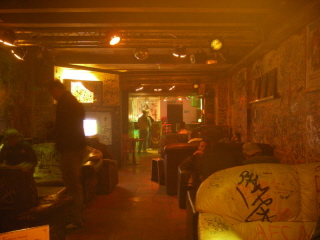Late last month, the European Court of Justice heard arguments in a case that could open the door to all but Dutch citizens being banned from the country's famous cannabis cafes. The case, Josemans v. Maastricht, pits a Dutch border town coffee shop owner against his municipal government, and behind it, the Dutch government and the governments of Belgium, France, and Germany.

The case pits Dutch drug policy, which tolerates the sale of marijuana through the coffee shops, but in which some now wish to incorporate a limiting of "drug tourism," against the European Union's laws governing free trade on the continent. The EU guarantees a free, unified market of goods and services among its members. The question now before the court is whether that should apply to Holland's tolerated-but-not-officially-legal coffee shop industry.
Joseman's lawyer, Andre Beckers, argued that marijuana is an economic commodity like any other and should be treated as such. But Sander Lely, representing the city of Maastricht argued that marijuana is "contraband" and cannot be covered by regulations governing licit commodities.
The Dutch and Belgian governments supported that argument, saying barring foreigners from the coffee shops was important for maintaining public order in the EU. The Belgian representative asked the court to consider the "nuisance" of French pot smokers driving through Belgium, drug smuggling, and coffee shop visitors driving back home while high.
But European Commission representative Hubert van Vliet warned of possible consequences if the court found that the coffee shops were not subject to EU laws. "Everything pertaining to coffee shops would then be exempt," he argued. "What will that mean for the border workers employed there? The free flow of capital would also be affected, which means only Dutch nationals would be allowed to own coffee shops."
Van Vliet also referred to an earlier ruling by the court in a case involving Polish prostitutes in Holland in which the court held that a member state could not let its own residents conduct a business while blocking other EU nationals from doing the same. And he asked why less onerous measures had not been tried. "The European Commission does not oppose a test case in itself," he said. "But why haven't less far-reaching measures been tried first, such as a customer-card system, reducing the maximum amount available to single customers (from 5 to 3 grams for instance) or requiring customers to consume purchased wares on the spot?"
There is no firm date for a ruling, but the court said it would move swiftly. Once the European Court of Justice makes its decision, the case will move back to the Dutch courts, where the Council of State is expected to rule before year's end. Until then, new measures aimed at keeping non-Dutch out of coffee shops are on hold.
This work by StoptheDrugWar.org is licensed under Creative Commons Attribution-ShareAlike 4.0 International
Comments
Unless I am mistaken, even
Unless I am mistaken, even if Joseman wins the case, Dutch towns may still ban non-EU members from it's coffeeshops. Since the US is not in the EU, banning Americans would be permitted, unless the free flow of goods provision means you can't exclude any foreign nationals.
Add new comment